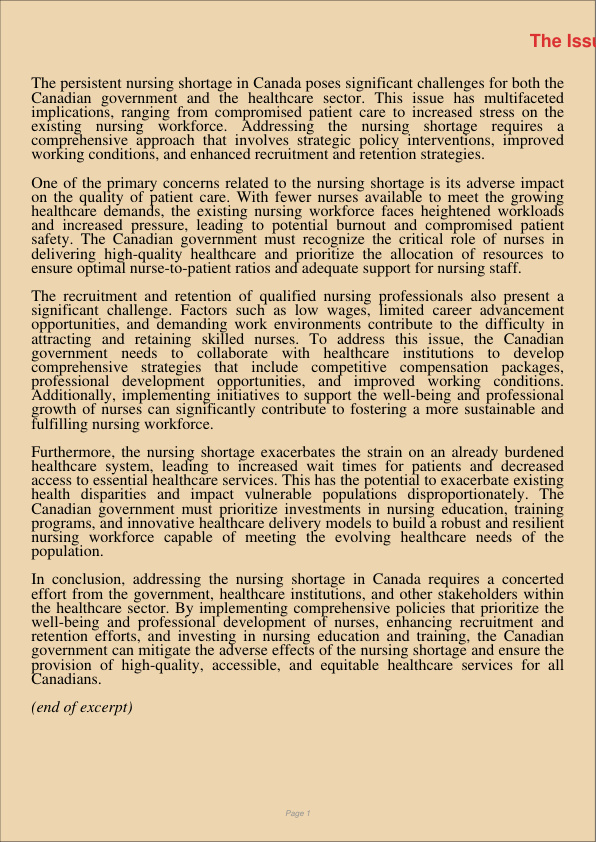The Issues Of The Nursing Shortage In Canadian Government And Medical Practice
Dec 31, 2023
nursing shortage
medical practice
Gender & Sexual Studies
English
The persistent nursing shortage in Canada poses significant challenges for both the Canadian government and the healthcare sector. This issue has multifaceted implications, ranging from compromised patient care to increased stress on the existing nursing workforce. Addressing the nursing shortage requires a comprehensive approach that involves strategic policy interventions, improved working conditions, and enhanced recruitment and retention strategies.
One of the primary concerns related to the nursing shortage is its adverse impact on the quality of patient care. With fewer nurses available to meet the growing healthcare demands, the existing nursing workforce faces heightened workloads and increased pressure, leading to potential burnout and compromised patient safety. The Canadian government must recognize the critical role of nurses in delivering high-quality healthcare and prioritize the allocation of resources to ensure optimal nurse-to-patient ratios and adequate support for nursing staff.
The recruitment and retention of qualified nursing professionals also present a significant challenge. Factors such as low wages, limited career advancement opportunities, and demanding work environments contribute to the difficulty in attracting and retaining skilled nurses. To address this issue, the Canadian government needs to collaborate with healthcare institutions to develop comprehensive strategies that include competitive compensation packages, professional development opportunities, and improved working conditions. Additionally, implementing initiatives to support the well-being and professional growth of nurses can significantly contribute to fostering a more sustainable and fulfilling nursing workforce.
Furthermore, the nursing shortage exacerbates the strain on an already burdened healthcare system, leading to increased wait times for patients and decreased access to essential healthcare services. This has the potential to exacerbate existing health disparities and impact vulnerable populations disproportionately. The Canadian government must prioritize investments in nursing education, training programs, and innovative healthcare delivery models to build a robust and resilient nursing workforce capable of meeting the evolving healthcare needs of the population.
In conclusion, addressing the nursing shortage in Canada requires a concerted effort from the government, healthcare institutions, and other stakeholders within the healthcare sector. By implementing comprehensive policies that prioritize the well-being and professional development of nurses, enhancing recruitment and retention efforts, and investing in nursing education and training, the Canadian government can mitigate the adverse effects of the nursing shortage and ensure the provision of high-quality, accessible, and equitable healthcare services for all Canadians.
